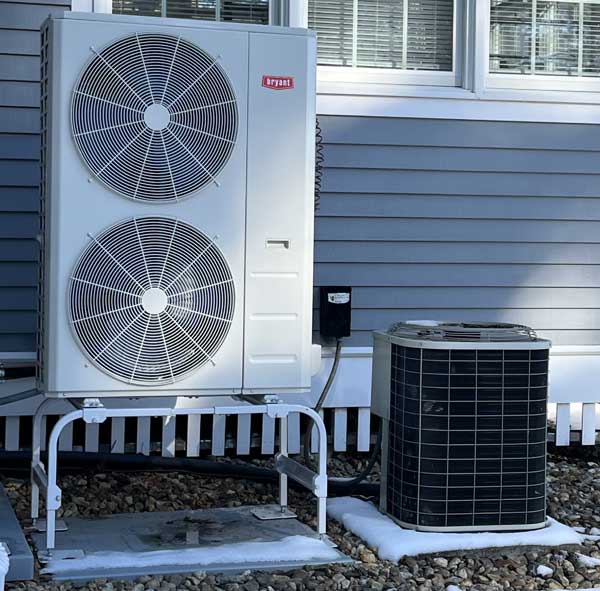A former electronics engineer highlights heat pump systems as environmentally-friendly home heating technology to fight winter cold

[photo of heat pump, Photo Credit to Nayeon Kim]
As the winter cold intensifies, Dr. Kim, a former research engineer from Samsung Electronics Co., one of the world’s leading home appliance manufacturers, advocates for heat pump systems with significantly-reduced amount of carbon production as an alternative source of home heating technology to more traditional heating devices like fossil fuel boilers.
“Heat pump systems use electricity instead of fossil fuels so it means less carbon footprint,” Dr. Kim explained.
Similar to air conditioners, heat pump systems operate by circulating refrigerants. While air conditioners only pull heat out to keep homes cool, the heat pump systems may either pull in or pull out heat, depending on the household need.
“Another advantage of the heat pump system is that it is able to not only heat but cool your homes so you no longer need an air conditioner. The heat pump system comes with a reversing valve which enables it to alternate between the cooling mode and the heating mode,” Dr. Kim noted.
He further added, “The refrigerant and the compressor are the key elements to understanding the mechanism of the heat pump system.” .
“Refrigerants are chemicals that transition between liquid to gas or from gas to liquid at specific temperatures as they absorb heat from their surroundings or release that heat,” Dr. Kim went on.
“The compressor is located outside of the building and mechanically compresses the refrigerant to be in high temperature and high pressure. The heat from such refrigerant is then transferred throughout the building by way of heat exchangers that are installed indoors,” Dr. Kim continued.
“However, the refrigerant already contains what is called residual heat from the natural environment and therefore, the compressor is actually not generating heat anew but squeezing heat out of the refrigerant so to speak,” Dr. Kim clarified.
“Residual heat refers to the heat that remains after something has been hot or heated up. There is always this residual heat in the natural environment such as air outside or in the ground even during winter times,” Dr. Kim added.
“There is a challenge for the heat pump system in the ultra-low temperature conditions because they mean a lack of residual heat to draw upon from the natural environment. However, we are continuing to see new efforts at high-efficiency heat pumps optimized for even regions with extremely cold weathers such as Alaska or northern Europe,” Dr. Kim concluded.
The LG Electronics Inc. notably launched in November 2023 the Advanced Cold Climate Heat Pump Laboratory in Alaska, the US, in collaboration with the University of Alaska Anchorage(UAA) and the University of Alaska Fairbanks(UAF) as well as opening in July 2024 the Air Solution Research Center in Frankfurt, Germany, in partnership with the European Consortium for Advanced Heat Pump Research(ECHAR).
Meanwhile, the Samsung Electronics Co. plans to debut a new line of heat pump systems at Consumer Electronics Show 2025, a major trade show held every January in Las Vegas, as part of its strategy to penetrate the HVAC(heat, ventilation and air conditioning) market in the US.

- Nayeon Kim / Grade 10
- Masconomet High School

![THE HERALD STUDENT REPORTERS [US]](/assets/images/logo_student_us.png)
![THE HERALD STUDENT REPORTERS [Canada]](/assets/images/logo_student_ca.png)
